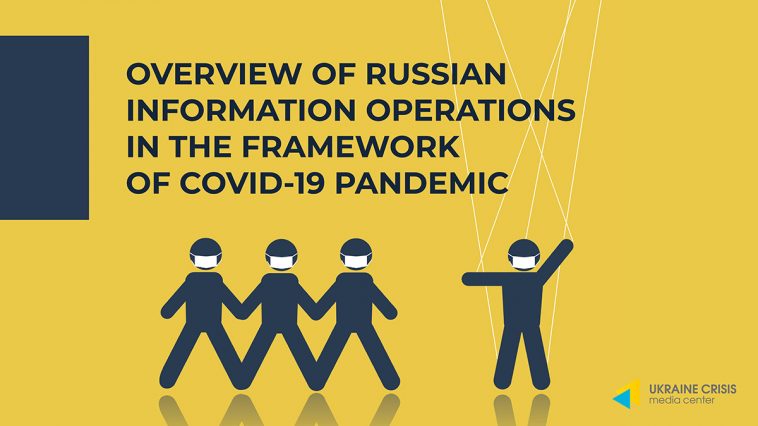The analytical report of Ukraine Crisis Media Center “Overview of Russian Information Operations in the Framework of COVID-19 Pandemic” was co-authored by Oleksandra Tsekhanovska, Head of Hybrid Warfare Analytical Group, and Liubov Tsybulska, Head of the Center for Strategic Communications and Information Security.
The authors pursued two goals with this report:
- to systemize all key trends of Russian disinformation in the framework of COVID-19 pandemic for the use of local experts working in the field of information security;
- to communicate to our Western partners the level of threat Kremlin’s disinformation poses for Ukraine.
The research was based on the analysis of open data – Russian state-controlled media, pro-Kremlin media in Ukraine, and also channels in various social media, in particular Telegram and Viber, where a substantial amount of fakes and manipulations is spread.
The key Russian narratives on COVID-19 have been defined within the study:
- “Authoritarian governments are more effective in countering the pandemic than democratic ones”;
- “Western alliances are ineffective and doomed to fail due to the COVID-inflicted challenges”;
- “Consequently, European and Euroatlantic aspirations of the potential EU and NATO member-states are futile”;
- “Pandemic has showcased that liberal values are obsolete”.
The danger of these narratives, which is a characteristic of all narratives of Russian disinformation, is in their long-lasting effects and adaptability. While they may adapt to the changing political and economic situation, their core message mostly remains unchanged.
Special attention was paid to conspiracy theories, which form a separate layer of disinformation and have the most lasting and destructive influence. The most intense conspiracy portrayed coronavirus as an American bioweapon, although there were many more.
Undermining trust in institutions has always been in the focus of disinformation, and its COVID-19 related part is no exception. The less the target audience trusts institutions, the more they are susceptible to malign influence. It is highly relevant in Ukraine, where the trust in bodies of authority is quite low, and the Kremlin exploits it in its information operations.
Active measures continue to be used by the Kremlin in the pandemic context as well, and the most vivid case in Ukraine was when the protests against evacuees from China in the town of Novi Sanzhary in February 2020 were incited through exploitation of local fears.
At this moment, the focus of Russian disinformation has shifted to the issue of vaccination, in which the Kremlin is mostly interested in pursuing two interconnected goals – discrediting Western vaccines and promoting Sputnik V.
Healthcare is the perfect target for disinformation, as it affects everybody. Attacking this sphere is an effective way to undermine Ukraine’s aspirations of European integration, which completely fits into the Kremlin’s agenda.
Public health has long been the target of Kremlin’s disinformation efforts, and they always pursue the same goal – to undermine trust in institutions. In this regard, Kremlin’s agents incorporate the narrative of Ukraine as a “failed state”, “external governance” etc., which are all strongly interconnected.
To combat the information attacks in the pandemic context, it is vital not only to strengthen Ukrainian healthcare system but to investigate the destructive activities of the agents of the Kremlin, to show that they are financed by the Russian government.


